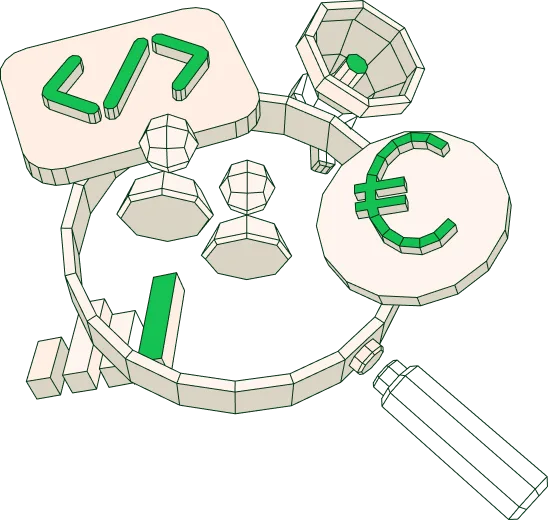Develop your growth-mindset and power skills!
De wereld digitaliseert in rap tempo. Data geeft inzicht in onmisbare gegevens en de ontwikkeling in technologie en AI creëert tal van nieuwe mogelijkheden. Heel waardevol voor organisaties, maar dit kan ook chaos veroorzaken. Data modeling zorgt daarbij voor helderheid en overzicht. Wat data modeling precies inhoudt en wat je er als organisatie mee kan, lees je in dit blog.
De definitie van data modeling
Data modeling is eigenlijk niets meer of minder dan het ontleden van verschillende datastromen. Het betreft het identificeren van entiteiten, relaties en attributen. Dit resulteert in modellen die de structuur van een database weergeven. Of simpeler gezegd: Data modeling is het maken van een plan voor hoe gegevens georganiseerd en opgeslagen moeten worden.
Het is als een kast indelen. Je beslist waar elk stuk informatie thuishoort, zodat je het later makkelijk kunt vinden en gebruiken. Data modeling helpt bedrijven en organisaties om hun gegevens goed te begrijpen en te gebruiken voor het maken van slimme beslissingen.
Wat is een datamodel?
Een datamodel is als een blauwdruk voor gegevens. Het toont de structuur van de gegevens en legt uit hoe verschillende stukjes informatie met elkaar verbonden zijn. Dit model helpt bij het effectief opzetten, opslaan en ophalen van gegevens, zodat ze makkelijk te begrijpen en te gebruiken zijn voor analyse en besluitvorming.
Vaak kan een datamodel visueel worden voorgesteld met behulp van een specifiek database diagram dat de essentiële elementen en hun onderlinge verbanden toont. Deze visuele representatie is een krachtig hulpmiddel voor ontwikkelaars en ontwerpers bij het begrijpen en communiceren van de complexe structuren binnen een database.
De toekomst van data modeling
De toekomst van data modeling zit vol met boeiende ontwikkelingen, gedreven door de voortdurende evolutie van technologieën. Eén veelbelovende trend is de opkomst van geavanceerde automatisering en Artificial Intelligence (AI) in data modeling processen. Met deze technologische vooruitgang genereer je sneller en nauwkeuriger complexe data modellen.
Werkt data modeling ook in de grotere systemen van een bedrijf? Absoluut! Dat komt doordat het flexibel in te zetten is. Datamodellen zijn niet een vast gegeven, maar kunnen veranderen en meegroeien met de behoeften van het bedrijf. Door datamodellen te gebruiken als flexibele tools, maak je het beheren en gebruiken van data sterker en actiever, waardoor het past bij de snel veranderende behoeften van je organisatie.
Probeer het uit
Data modeling heeft de manier waarop wij kijken naar verschillende data en informatiestromen opnieuw vormgegeven. Met de digitalisatie die door onze maatschappij stormt als een bulldozer, is het van steeds groter belang dat we begrijpen wat er allemaal met de data gebeurt en hoe dit wordt gebruikt en toegepast in de echte wereld. Precies om deze reden kiezen steeds meer mensen ervoor om zich te verdiepen in data modeling en data visualisatie. Een waardevolle aanvulling op je organisatie dus. Meer leren over data modeling? Via de Striive Academy vind je verschillende trainingen.
Hard and soft skills
All technical skills necessary to perform certain tasks fall under hard skills. These are therefore mainly 'concrete' skills. Examples include accounting, data analysis, web development and speaking other languages. Hard skills are measurable skills that can be tested.
Skills that relate to all social aspects that are important within an organization are called soft skills. These include elements such as communication, teamwork, conflict resolution and leadership. Soft skills are often broadly applicable across industries and environments. HR teams are also increasingly alert to selecting people with a strong soft skillset.
Develop better power skills
Improving hard skills and soft skills does require a slightly different approach. For hard skills, for example, you can attend workshops, do courses or attend training sessions. Especially with practical practice, you can grow considerably in these. Soft skills focus mainly on feelings. Developing your soft skills is best done by applying theoretical knowledge in practice as soon as possible. Also learn from the behavior of people with stronger soft skills.
When you want to grow both personally and professionally, it is smart to keep developing. Challenge yourself and learn new skills. You can do this, for example, with the Striive Academy. Look here for more information about the training courses we offer.
